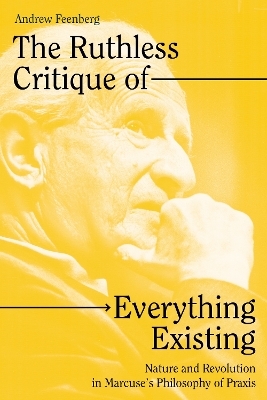
The Ruthless Critique of Everything Existing
Nature and Revolution in Marcuse's Philosophy of Praxis
Seiten
2023
Verso Books (Verlag)
978-1-80429-083-5 (ISBN)
Verso Books (Verlag)
978-1-80429-083-5 (ISBN)
How Marcuse helps us understand the ecological crisis of the 21st century
For several years after 1968, Herbert Marcuse was one of the most famous philosophers in the world. He became the face of Frankfurt School Critical Theory for a generation in turmoil. His fame rested on two remarkable books, Eros and Civilization and One-Dimensional Man. These two books represent the utopian hopes and dystopian fears of the time.
In the 1960s and 70s, young people seeking a theoretical basis for their revolution found it in his work. Marcuse not only supported their struggles against imperialism and race and gender discrimination, he foresaw the far-reaching implications of the destruction of the natural environment. Marcuse's Marxism was influenced by Husserl and Heidegger, Hegel and Freud. These eclectic sources grounded an original critique of advanced capitalism focused on the social construction of subjectivity and technology. Marcuse contrasted the "one-dimensionality" of conformist experience with the "new sensibility" of the New Left. The movement challenged a society that "delivered the goods" but devastated the planet with its destructive science and technology. A socialist revolution would fail if it did not transform these instruments into means of liberation, both of nature and human beings. This aspiration is alive today in the radical struggle over climate change. Marcuse offers theoretical resources for understanding that struggle.
For several years after 1968, Herbert Marcuse was one of the most famous philosophers in the world. He became the face of Frankfurt School Critical Theory for a generation in turmoil. His fame rested on two remarkable books, Eros and Civilization and One-Dimensional Man. These two books represent the utopian hopes and dystopian fears of the time.
In the 1960s and 70s, young people seeking a theoretical basis for their revolution found it in his work. Marcuse not only supported their struggles against imperialism and race and gender discrimination, he foresaw the far-reaching implications of the destruction of the natural environment. Marcuse's Marxism was influenced by Husserl and Heidegger, Hegel and Freud. These eclectic sources grounded an original critique of advanced capitalism focused on the social construction of subjectivity and technology. Marcuse contrasted the "one-dimensionality" of conformist experience with the "new sensibility" of the New Left. The movement challenged a society that "delivered the goods" but devastated the planet with its destructive science and technology. A socialist revolution would fail if it did not transform these instruments into means of liberation, both of nature and human beings. This aspiration is alive today in the radical struggle over climate change. Marcuse offers theoretical resources for understanding that struggle.
Andrew Feenberg is the author of Lukács, Marx and the Sources of Critical Theory (1981), Critical Theory of Technology (1991), Alternative Modernity (1995), Questioning Technology (1999), When Poetry Ruled the Streets: The May Events of 1968 (2001), Transforming Technology (2002), Heidegger and Marcuse: The Catastrophe and Redemption of History (2005), and Between Reason and Experience: Essays in Technology and Modernity (2010), The Philosophy of Praxis (2014), Technosystem: The Social Life of Reason (2017), and Nishida, Kawabata, and the Japanese Response to Modernity (2019).
| Erscheinungsdatum | 02.03.2023 |
|---|---|
| Verlagsort | London |
| Sprache | englisch |
| Maße | 140 x 210 mm |
| Gewicht | 236 g |
| Themenwelt | Geisteswissenschaften ► Philosophie ► Philosophie der Neuzeit |
| Sozialwissenschaften ► Politik / Verwaltung ► Politische Systeme | |
| Sozialwissenschaften ► Politik / Verwaltung ► Politische Theorie | |
| ISBN-10 | 1-80429-083-1 / 1804290831 |
| ISBN-13 | 978-1-80429-083-5 / 9781804290835 |
| Zustand | Neuware |
| Informationen gemäß Produktsicherheitsverordnung (GPSR) | |
| Haben Sie eine Frage zum Produkt? |
Mehr entdecken
aus dem Bereich
aus dem Bereich


